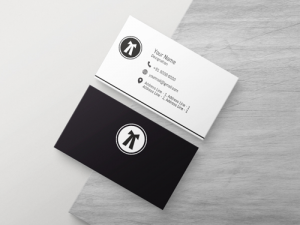The Power of First Impressions: How Your Advocate Visiting Card Can Make a Difference
The Power of First Impressions: How Your Advocate Visiting Card Can Make a Difference
In the legal world, where perception and professionalism play a pivotal role, the power of first impressions cannot be overstated. From the moment you step into a courtroom or a meeting with a client, every aspect of your appearance and presentation contributes to the image you convey. One often overlooked, yet essential tool in making that first impression is the advocate visiting card. In this blog, we will explore the profound impact of advocate visiting cards on first impressions in advocacy and how a well-designed advocate business card can influence your professional image.
The Advocate Visiting Card: A Symbol of Professionalism
An advocate visiting card is not just a piece of paper; it's a symbol of professionalism and competence. When you hand over your card to a client, colleague, or judge, you are giving them a tangible representation of your legal practice. The card should reflect not just your contact information but also your commitment to your profession. Here's how it can make a significant difference:
1. Conveys a Sense of Preparedness
When you offer your advocate a visiting card, it immediately conveys that you are prepared and organized. The act of having a well-designed card at your disposal shows that you take your role seriously and that you are ready to establish a professional connection.
2. Enhances Credibility
Your card serves as a tool for establishing credibility. A thoughtfully designed advocate visiting card with the right information, font choices, and layout sends the message that you pay attention to detail, which is a critical quality in the legal profession.
3. Creates a Lasting Memory
The brain tends to remember visual information more effectively than spoken words. When someone receives your advocate visiting card, it gives them a visual memory of you and your practice. A memorable card can ensure that your name and contact information linger in their minds.
The Art of Making a Lasting First Impression
First impressions are formed within seconds, and they can be challenging to change once established. When it comes to advocacy, where trust and competence are paramount, making a positive first impression is critical. Here's how your advocate visiting card can contribute to this process:
1. Professional Aesthetics
The aesthetics of your advocate visiting card play a significant role in creating a positive first impression. A professionally designed card with a clean layout, elegant typography, and a well-balanced color scheme can captivate the recipient's attention and make you stand out.
2. Information Clarity
A cluttered or disorganized card can confuse the recipient and lead to a negative impression. Ensure that your contact information is presented in a clear and concise manner. Use legible fonts and avoid overcrowding the card with unnecessary details.
3. Brand Consistency
If you belong to a law firm, your advocate visiting card should be consistent with the firm's branding. This consistency reinforces your association with the firm and its reputation. It also reflects a level of professionalism and unity.
4. Unique Elements
Consider incorporating unique elements that represent your legal specialization. For instance, a symbol of justice, a gavel, or other legal icons can give your card a distinct touch, showcasing your area of expertise.
Influence in the Legal Profession
The influence of your advocate visiting card goes beyond mere aesthetics. It has a profound impact on how others perceive you as an advocate. Let's explore how it can influence various aspects of the legal profession:
1. Client Trust
When a potential client receives your advocate visiting card, they should feel a sense of trust and confidence in your abilities. A well-designed card conveys that you are a professional who takes your role seriously, and this can be a deciding factor in choosing you as their advocate.
2. Networking and Referrals
In the legal world, networking is key. Your advocate visiting card acts as your representative in various networking events, conferences, and meetings. It can lead to referrals, partnerships, and collaborations, depending on the impression it creates.
3. Courtroom Presence
As an advocate, you often engage with judges, opposing counsel, and court personnel. The impression your advocate visiting card leaves can influence how you are perceived in the courtroom. A professional card can subconsciously convey that you are prepared and competent.
4. Professional Opportunities
Your advocate visiting card can open doors to professional opportunities you may not have considered. It could lead to speaking engagements, panel discussions, or invitations to legal conferences. These opportunities often arise when others are impressed by your professional image, which begins with your card.
Tips for an Effective Advocate Visiting Card
Now that we understand the power of advocate visiting cards in making a positive first impression, let's explore some practical tips for designing an effective card:
1. Choose the Right Size
Stick to the standard size of 3.5 inches by 2 inches. This ensures that your card fits easily into cardholders and wallets, making it more convenient for recipients.
2. Professional Color Scheme
Select a color scheme that exudes professionalism. Conservative colors like navy, black, and dark gray are often associated with the legal profession. Use a secondary color to add a touch of personality, but ensure it complements the primary color well.
3. Typography Matters
Choose clear, readable fonts for your card. Serif fonts like Times New Roman or sans-serif fonts like Arial work well. Pay attention to font size and style to make the card information easy to read.
4. Contact Information
Include essential contact details: your name, title (e.g., Attorney at Law), law firm name, phone number, email address, and physical address. If you have a website, LinkedIn profile, or other relevant social media accounts, consider including them as well.
5. Quality Printing
Invest in high-quality printing to ensure the colors are accurate, and the text is sharp. The choice between matte and glossy finishes depends on your preference, but matte finishes are generally considered more professional.
6. White Space
Allow for adequate white space on the card to enhance readability and aesthetics. White space helps guide the recipient's eye to the essential information without distractions.
7. Unique Elements
Consider incorporating unique elements that reflect your specialization, such as legal icons, symbols of justice, or a legal-focused tagline.
Conclusion
Your advocate visiting card is more than just a piece of paper; it's a powerful tool for creating lasting first impressions in the field of advocacy. By investing time and effort into its design, you can convey professionalism, enhance credibility, and open doors to various professional opportunities. Remember that in the legal world, where trust and competence are of utmost importance, a well-designed advocate visiting card can be the difference between success and missed opportunities. Make it count, and let it be your silent advocate in every interaction.










